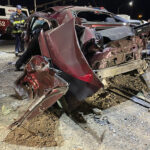The Property Casualty Insurers Association of America (PCI) is applauding New Jersey lawmakers for introducing bipartisan legislation that would reverse a decision handed down by the State Supreme Court that will reportedly increase rates for more than 4 million New Jersey drivers. Four bills (A-4227, S-2705, S-2688, A-4381) have already been filed to reverse the ruling.
“We are extremely pleased that the New Jersey Legislature has recognized the negative impact of the recent Supreme Court ruling and is taking action to reverse the decision,” said Richard Stokes, regional vice president for PCI. “We are hopeful the Legislature will act quickly to continue positive auto insurance reforms that we have seen over the last year.”
“We believe the fact that one of the sponsors of the bills, Assemblyman Bateman, is the original sponsor of the auto reform bill recently challenged by the Supreme Court is telling as to the legislative intent to reduce costs,” said Stokes. “We believe it is critical that the Legislature act now to reverse a bad decision for all New Jersey drivers. These bills can do that.”
The DiProspero v. Penn ruling centers on an option in a law passed by the state legislature in 1998, the Automobile Insurance Cost Reduction Act (AICRA), which provides policyholders with the choice of lower premium payments in exchange for limiting their right to sue for noneconomic damages in minor injury cases. That option restricts an accident victim covered by the policy from suing for noneconomic damages unless the victim suffers a bodily injury which results in death; dismemberment; significant disfigurement or significant scarring; displaced fractures; loss of a fetus; or a permanent injury other than scarring or disfigurement. As part of this, the Legislature and the courts required victims to prove that they suffered a serious life impact.
“A 2003 independent study concluded that allowing damages for minor injuries would cost the typical two-car family, that chooses the limitation lawsuit option, an additional $300 per year,” said Stokes. “The bottom line is that the decision is a major step backward for New Jersey auto insurance consumers.”
PCI is currently reviewing the legal impact the decision has on AICRA. In particular, PCI is conducting a legal review of the impact the decision has on the 15 percent rate rollback mandated by AICRA. It is uncertain how the Supreme Court intended to handle the mandated rollback in light of its decision on the verbal threshold. Insurers are required to maintain fair and sound rates for consumers and this decision will add costs to the system that AICRA took out.
“We believe that it is important for us to better understand the full extent of the decision,” added Stokes. “Since these costs were taken out of the system prior to the decision, we believe it is important to consider the decision’s impact on New Jersey consumers.”
Was this article valuable?
Here are more articles you may enjoy.

 Hawaiian Electric Hits 40-Year Low Ahead of Maui Fire Report
Hawaiian Electric Hits 40-Year Low Ahead of Maui Fire Report  Report: Vehicle Complexity, Labor ‘Reshaping’ Auto Insurance and Collision Repair
Report: Vehicle Complexity, Labor ‘Reshaping’ Auto Insurance and Collision Repair  SC High Court Strikes ‘Troubling’ Denial of Comp Claim, Says Can’t Be Based on Stats
SC High Court Strikes ‘Troubling’ Denial of Comp Claim, Says Can’t Be Based on Stats  California Chiropractor Sentenced to 54 Years for $150M Workers’ Comp Scheme
California Chiropractor Sentenced to 54 Years for $150M Workers’ Comp Scheme 